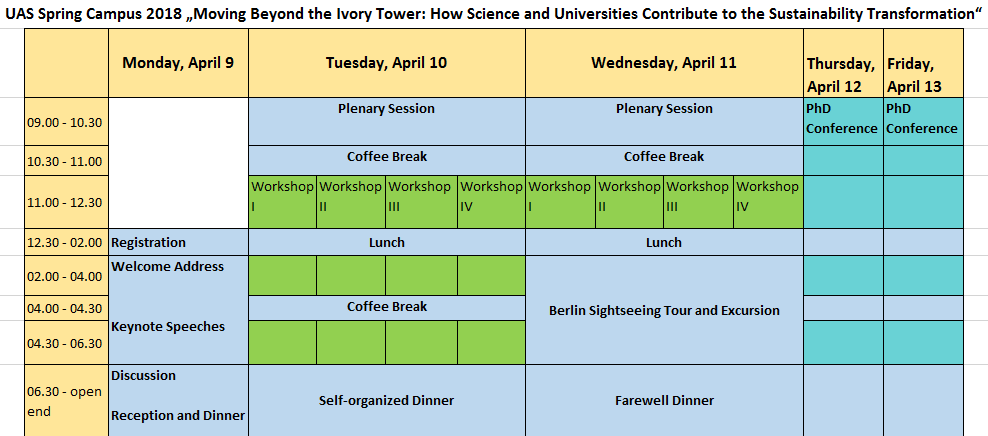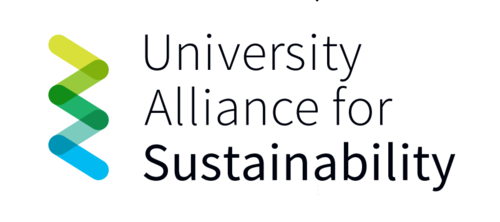Spring Campus 2018
Moving beyond the Ivory Tower: How do Science and Universities Contribute to the Sustainability Transformation?
From April 9-13, 2018 Freie Universität will host the third Spring Campus conference of the University Alliance for Sustainability.
Program focus and objectives
A complete overview of the conference program is available in our Spring Campus Guide.
2017 was a year of profound political challenges for sustainable development. Science and research have been especially affected, as they are increasingly met with skepticism and even populist hostility. While the 17 Sustainable Development Goals (SDGs) set the agenda for a societal transformation, scientifically grounded policy decisions like international climate agreements are questioned.
Against this backdrop the Spring Campus Conference of the University Alliance for Sustainability poses the question, how science and universities may contribute to the sustainability transformation. We are looking forward to a controversial debate on the following questions:
- Should universities become active stakeholders in the public discourse or would this affect their independence as research and education institutions?
- May the 17 SDGs become a normative compass for research or does this interfere with the freedom of research?
- How do research innovations from different disciplines affect the societal transformation to sustainability?
Science and Society
Science and research lay the foundation for the critical reflection of the SDGs as well as for their implementation. While often associated of being detached from society in an Ivory Tower, scientists’ research findings, technological and social innovations shape our world’s future. As outstanding places of knowledge creation and educational institutions, universities can play a crucial role in shaping sustainable development.
The Role of Universities
Although the impact of research is evident, science and research are increasingly met with skepticism. Universities as renowned and public institutions often have the opportunity to become a mediator by introducing latest scientific innovation. At the same time, societies have to admit that the answers to a huge challenge like sustainable development are often complex and scientific in nature. In fact, science can offer deliberative approaches, which reiterates the paramount importance of seeking dialogue with the society. University networks like the University Alliance for Sustainability prove the relevance of international academic networks. They can forge international, regional and local links with other academic and civil society networks in order to foster the intellectual exchange and the public understanding of sustainable development.
From the ivory tower into the society
Scientists – especially in the natural sciences – are often working on innovative solutions for the challenges society has yet to face. To unfold its full potential research often has to overcome the hurdles of funding, market application and public acceptance. The conference will introduce state of the art research from the natural and social sciences, while engaging scientists of different disciplines in a debate about their research questions and findings.
Program Design
The Opening Day features keynote speeches from renowned experts as well as presentations from representatives from UAS partner universities. The talks will be followed by a panel discussion on the overall topic, elaborating on sciences and universities contributions beyond the ivory tower.
On Tuesday and Wednesday (April 10-11) we will continue with a program of parallel research and management workshops. We are inviting contributions from all disciplines.
- Workshop I: “Implementing the Agenda 2030 (Sustainable Development Goals) and Climate Policies” chaired by Prof. Sabrina Habich Sobiegalla, Dr. Berthold Kuhn (FUB), Prof. Dai Hancheng (PKU)
- Workshop II: “Climate Change Policy and Social Networks” chaired by Prof. Nina Kolleck (FUB), Prof. David Tindall (UBC), Alexandra Goritz (FUB)
- Workshop III: “Accelerating Technological Sustainability Transitions by Overcoming Adoption and Diffusion Barriers in Energy Transitions” chaired by Dr. Elisabeth Eppinger, Carsten Schwäbe, Prof. Carsten Dreher (FUB)
- Workshop IV: “Sustainability Management at Universities: What is the Critical Impact of Governance?” chaired by Prof. Inka Bormann, Andreas Wanke, Katrin Risch (FUB)
Additionally, a PhD Conference will be organized, which will complete the Spring Campus with a two-day meeting on Thursday and Friday (April 12-13).
- PhD Workshop: “Sustainability and Inequalities” chaired by Dr. Paul Talcott (FUB)
- Workshop Program

In 2016 and 2017, in each year 120 and 150 participants from over twelve countries attended the Spring Campus Conferences. We look forward to welcoming participants from all over the world to once again to critically reflect on the role of universities as societal actors and their integral function for the great transformation.
Further information and a complete program of the Spring Campus 2018 will be available on this website soon. Until then we invite you to browse the documentation of the previous conferences. In case of any questions you are welcome to contact UAS program manager Katrin Risch (katrin.risch@fu-berlin.de).

